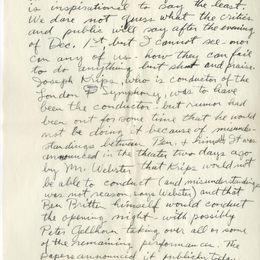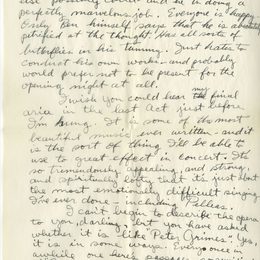In October 1951 American baritone Theodor (‘Ted’) Uppman arrived in England to begin rehearsing the title role in Britten’s new opera Billy Budd with the premiere scheduled for 1st December. During his stay Uppman wrote regularly to his wife Jean back home in North Hollywood and we are fortunate that Uppman’s family has given these letters to our archive. They give a unique and personal insight into preparations for the opera’s premiere and its reception, as well as life as an opera star in London at the time.
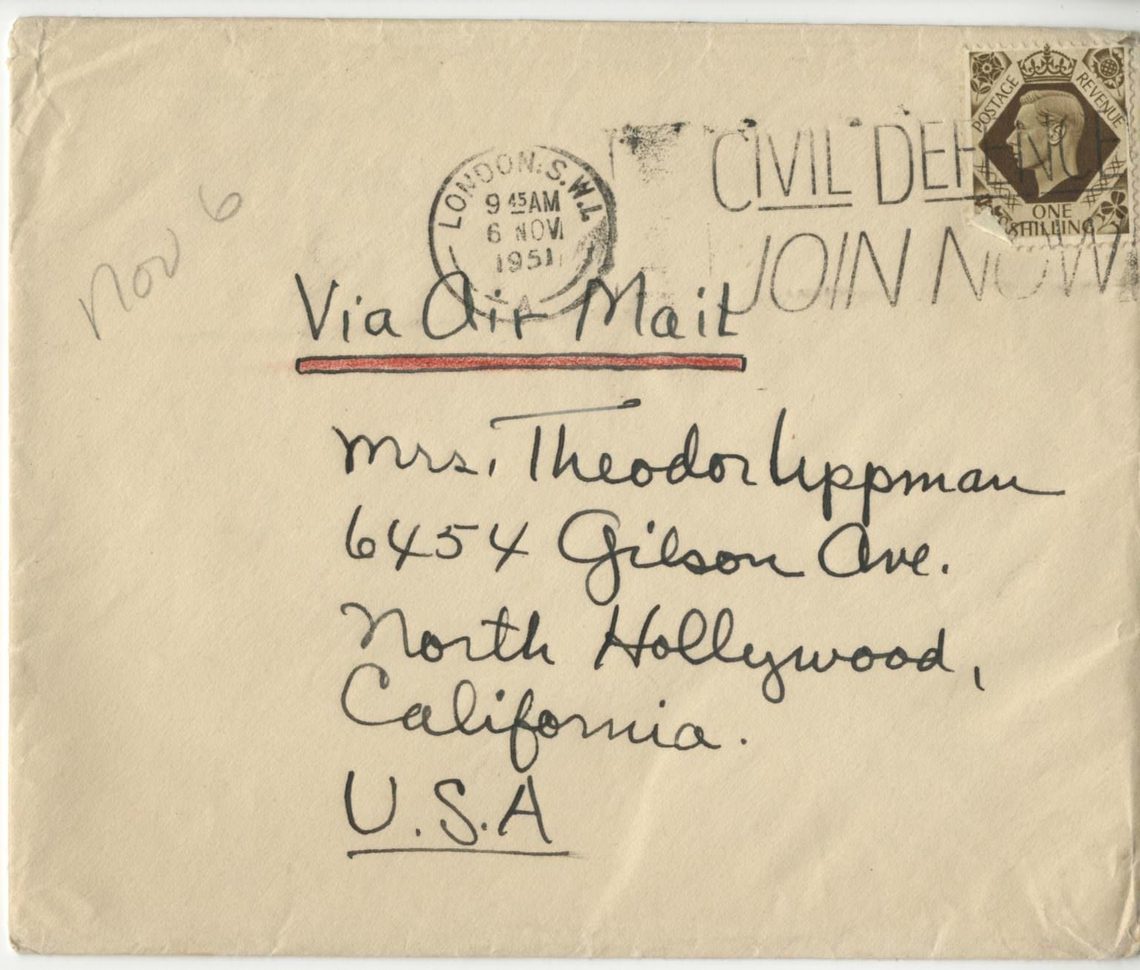
Envelope addressed to Jean Uppman, November 1951.
Uppman writes with enthusiasm about London despite often feeling the cold, reporting in his first letter that ‘It is bitterly cold everywhere’ as fuel is ‘so terribly scarce and expensive’. Many things are rationed and ‘food is very scarce especially meat’. He asks Jean to send pairs of nylons for the wife of Sir Steuart Wilson, deputy general administrator of the Royal Opera House, as well as Hershey chocolate bars as ‘sweets are on the ration list and hard to get’.
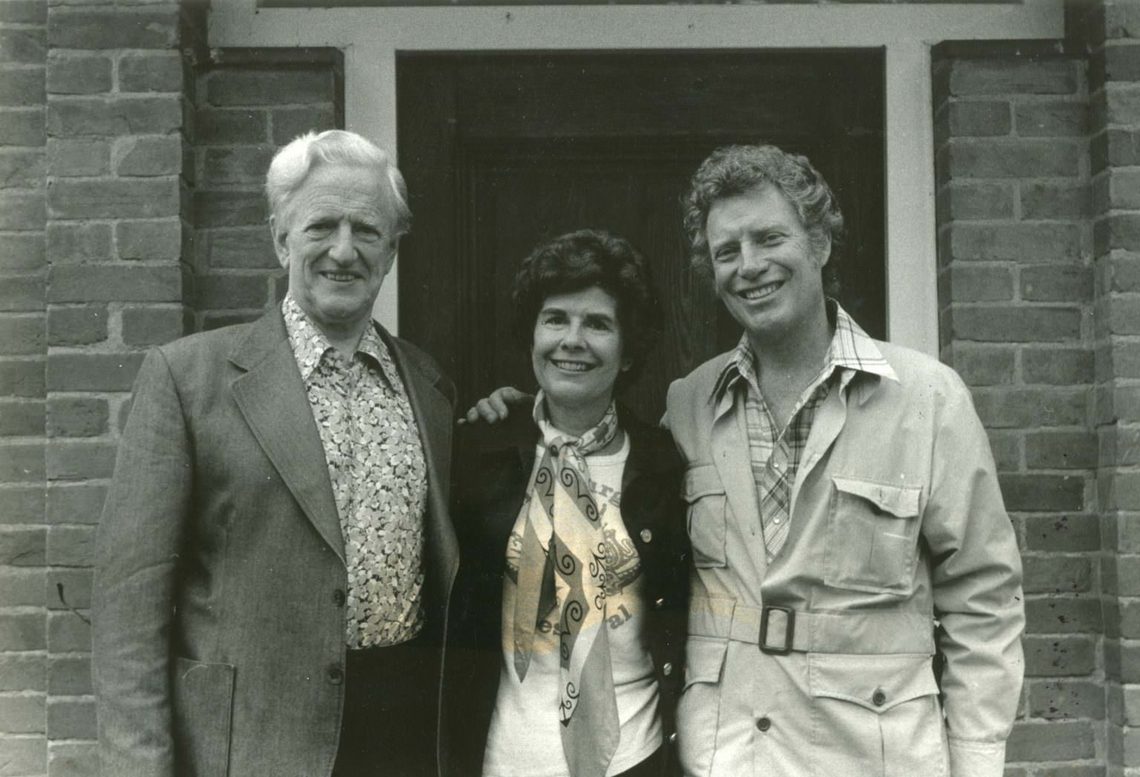
Pears with Jean and Ted Uppman outside The Red House, Aldeburgh, 1978, photo: Rita Thomson.
Uppman writes to Jean about concerts and operas he went to and famous people he met, being particularly thrilled to meet Ralph Vaughan Williams, and Kathleen Ferrier who was ‘so friendly and cheerful’. At an Election Party at the Savoy Hotel on 25th October he met composers, conductors, writers and actors, from Arthur Bliss to Greta Garbo, as the election results were ‘posted on a big score board’ and the return of Winston Churchill as Prime Minister announced. Uppman’s letters give a colourful flavour of life in London.
The letters are however most interesting for their first-hand accounts of progress rehearsing Billy Budd and the success of the opera’s first run at Covent Garden. Uppman started rehearsing straight away, working regularly every morning at the home of one of the repetiteurs, as he could not work at the ROH until his work permit came through. On 21st October he met Britten and Pears for the first time after their recital at the Victoria & Albert Museum.
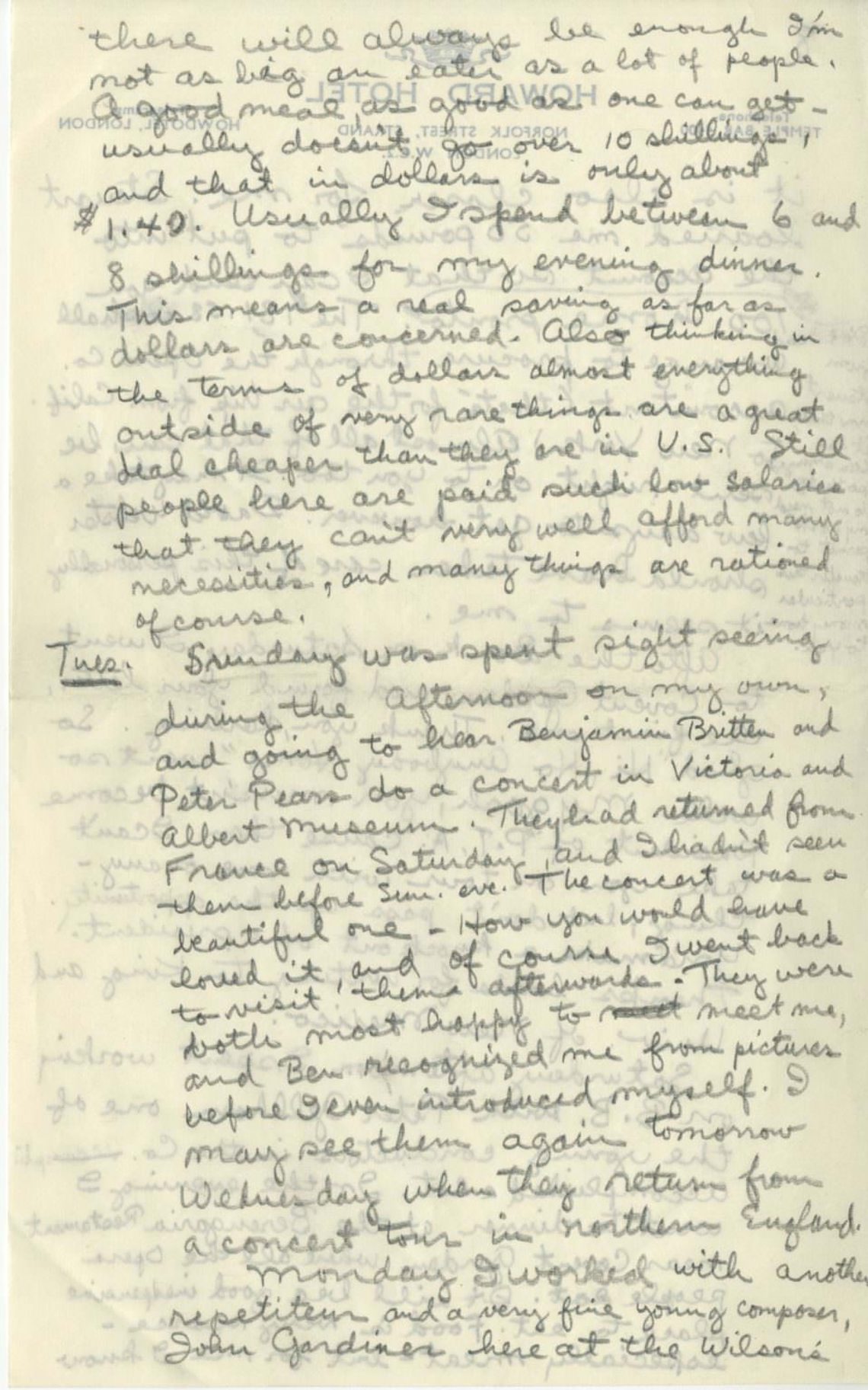
Ted’s first letter to Jean describing his first meeting with Britten and Pears, October 1951.
Rehearsals then moved to the ROH – long full days of rehearsing from 10am. At the end of October Uppman writes ‘I began blocking out scenes with Peter Pears and the rest – and that’s all we’ve been doing, every day – we’ll soon have the whole opera set as far as movements & business is concerned’. He describes producer Basil Coleman as ‘excellent – a young, spirited and imaginative man’.
On 7th November Uppman had a rehearsal on his own with Britten in his flat ‘to go through most of the score and to talk over the character of Billy Budd’ – he describes his impressions of Britten to Jean. Britten invited him to Aldeburgh ‘He loves it there and hates London. He wants me to meet some of his wonderful fishermen friends – one in particular called Billy’.
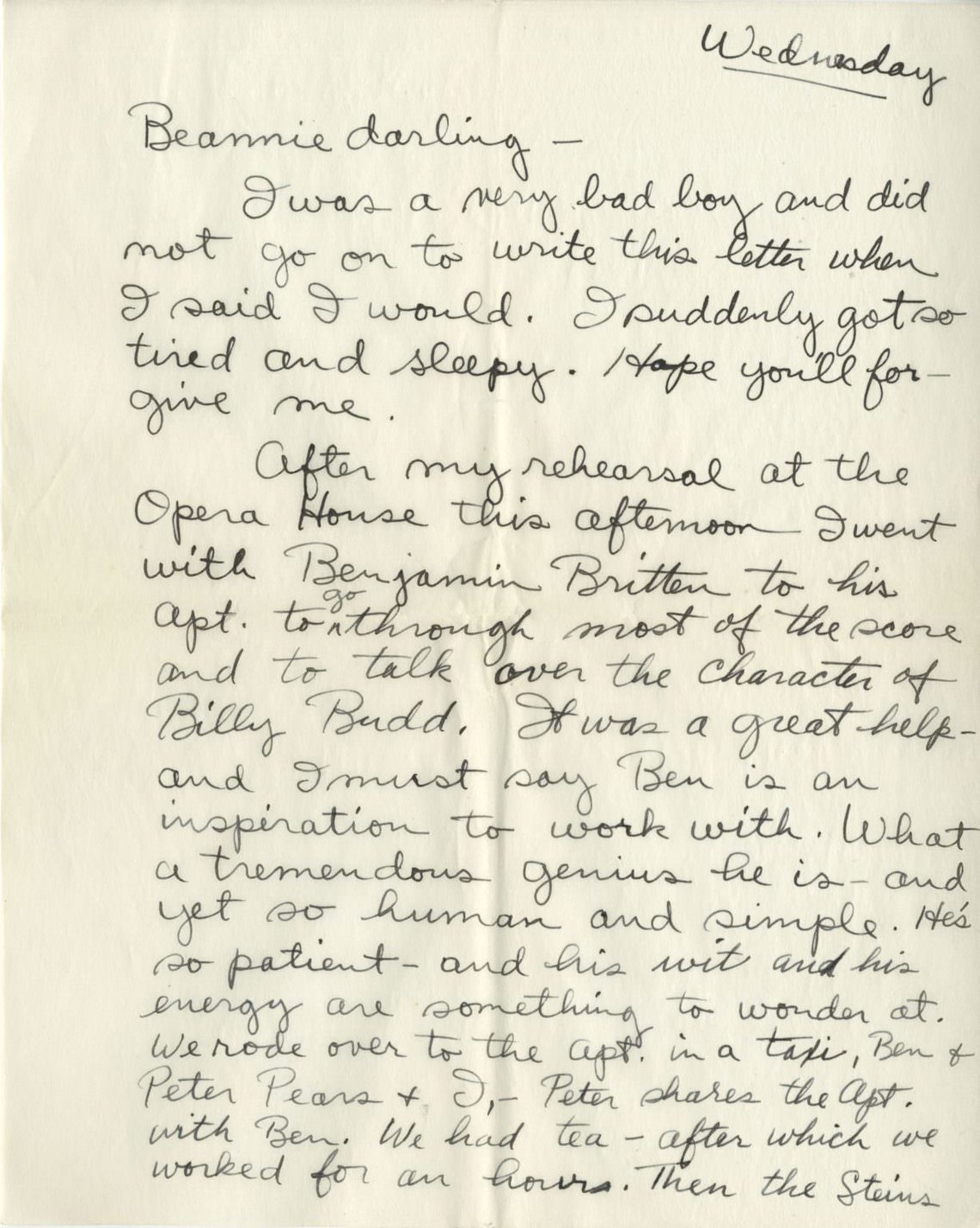
Uppman’s letter describing Britten, November 1951.
Orchestral rehearsals began on 21st November then two days later, just a week before opening night, it is announced that Britten himself will conduct the premiere, rather than Joseph Krips as had been planned. Uppman reports how pleased he is but describes the composer’s fears: ‘Ben himself says that he is absolutely petrified at the thought. Has all sorts of butterflies in his tummy. Just hates to conduct his own works – and probably would prefer not to be present for the opening night at all’.
Image gallery
Incidentally, we hold in our archive the hand-written full orchestral score which Britten used to conduct from in the orchestra pit. It bears an unusually large number of annotations made as aide-mémoires compared to his other conducting scores suggesting that Britten was indeed as nervous as Uppman described.
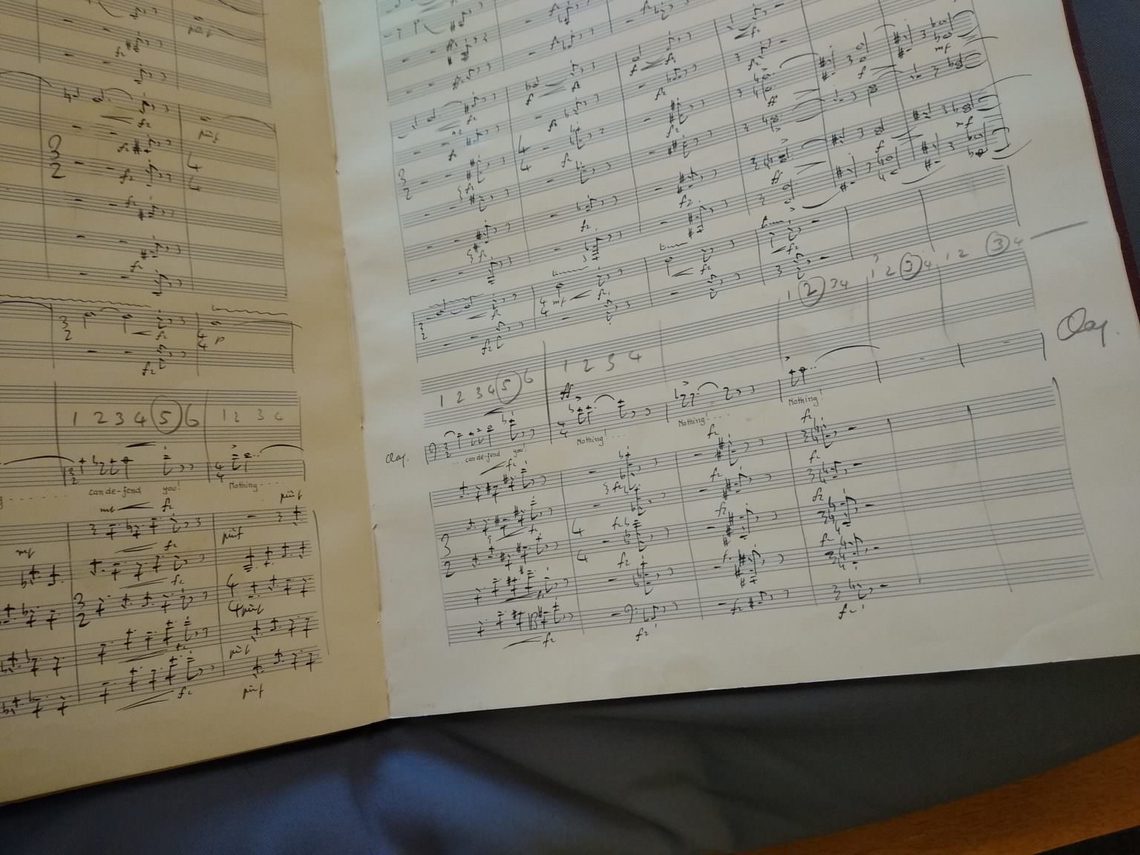
Britten’s orchestral score with his conducting annotations.
Uppman describes the cast to Jean as ‘miraculous in it’s quality’ adding ‘you would think with so many tenors & baritones & basses piled up together in one opera that there would be jealousies at least here and there – but if there are I have not detected them’.
29th November saw the ‘first full dress rehearsal all the way through the opera (with piano only) and I for one feel 100% better about the whole thing’. When not rehearsing Uppman was kept busy with photographers and interviewers, writing ‘My picture has been in various papers numerous times with little stories about me, and from that I have had hundreds of people recognise me and speak to me’, then after he appeared on TV’s ‘Picture Page’ he was ‘almost swamped’.
Uppman describes, in his letter of 4th December, the thrill and fun of the first night and the ovation he received: ‘the cheers & bravos & stamping is still ringing in my ears’. He continues ‘Everyone in the cast out did himself’ and ‘Ben was tremendously happy at the end’. He writes about the huge press interest and ‘rave notices’, finding less time to write to his wife as ‘I’ve been busier than I ever imagined I could be answering fan-mail and first night telegrams’ – as well as requests for pictures and autographs.
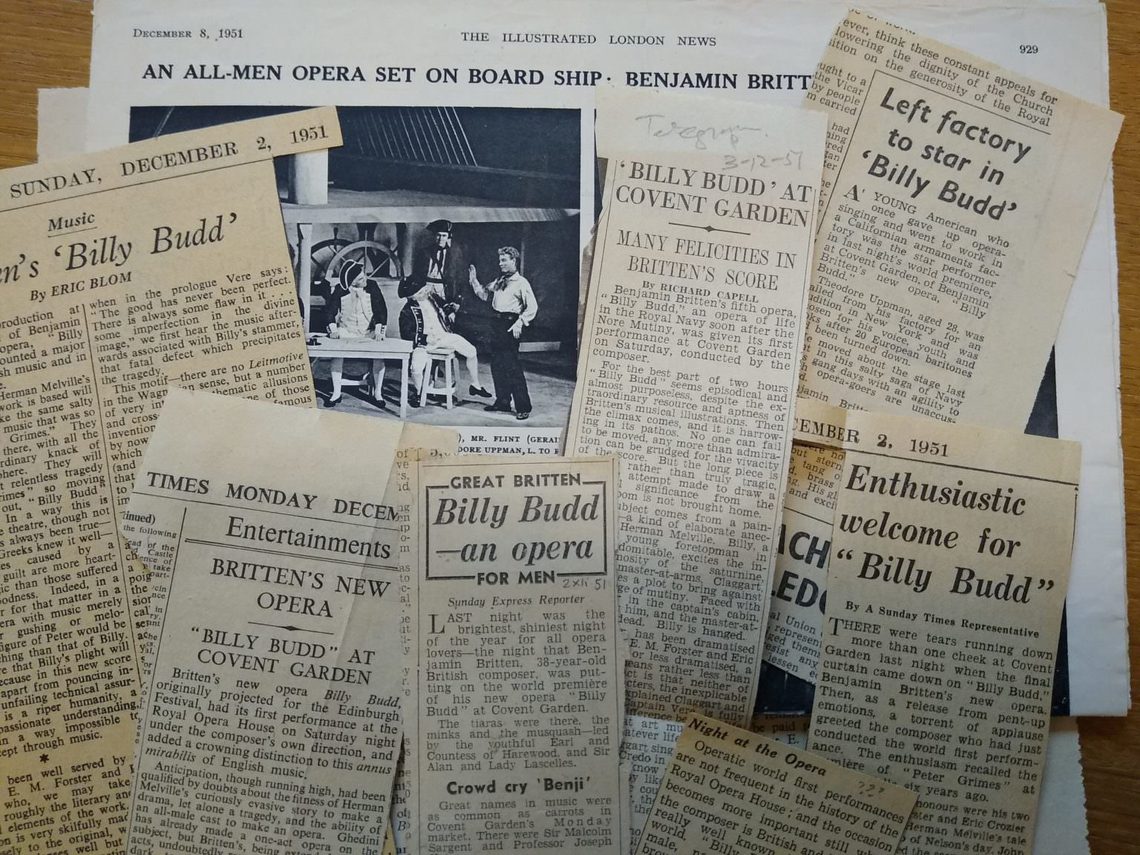
Some of the many press reviews from December 1951.
Following the premiere there are parties and many invitations. On 5th December he has dinner with librettists E.M. Forster and Eric Crozier. On 6th December Joyce Grenfell invites him to see her Penny Plain Revue and to a ‘very fashionable party’ afterwards.
Uppman sends his wife several sets of press clippings, noting ‘It seems as though every paper and magazine in England had a critic at the first night performance – and everyone without an exception seems to have given me and the opera and excellent write-up’. He writes that ‘Billy Budd was now officially considered a complete success by the Covent Garden Opera Co. and would remain in the repertoire’. As for himself, he feels that the opera has raised his confidence as well as set up a future for him – he has been asked to return in the Spring to do further performances of Billy Budd as well as lead roles in The Magic Flute, La Bohème and The Pilgrim’s Progress.
You can read all of Uppman’s letters and see his signed first night programme on our online archive catalogue.
- Judith Ratcliffe, Archivist

